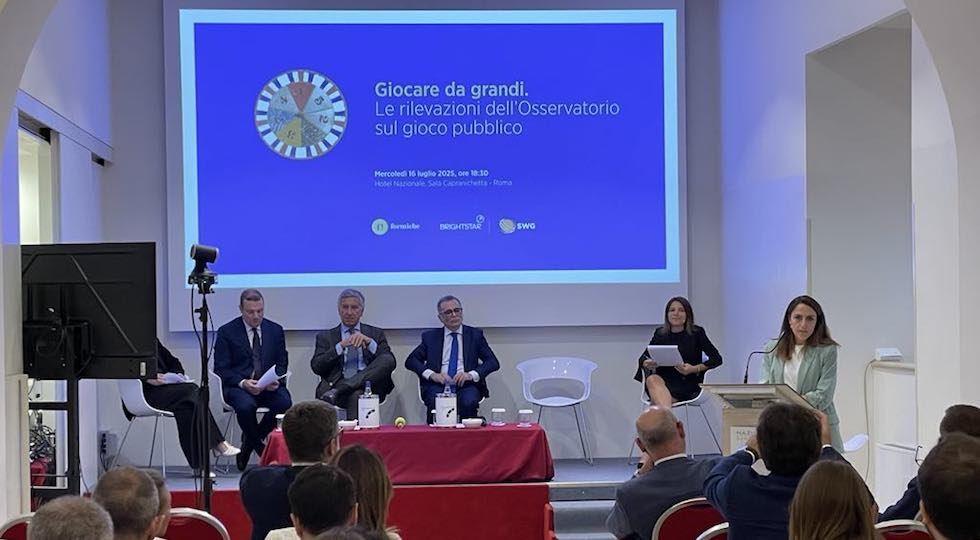
SWG, Psychologists, and Gambling Compulsive Disorder: A Complex, Never-Ending, and Growing Phenomenon
The SWG study of 101 psychologists and psychiatrists captured pathological gambling from the perspective of experts and was presented today in Rome with Brightstar and Formiche: patients who are growing but with multiple pathologies and never addressed by public services.
The SWG study, in collaboration with Brightstar and Formiche, was presented today at the Hotel Nazionale in Rome, as part of the surveys conducted by the Observatory on Public Gambling, "Giocare da Grandi". This time, the analysis focused on the perspectives of psychologists and psychotherapists on "Italians and pathological gambling." The exploratory research involved 101 experts on the topic. While not representative on a national scale, the survey provides a realistic and detailed snapshot of clinical experience in the field.
The quantitative survey of psychologists and psychotherapists involved 101 interviews conducted using CATI (Computer Assisted Telephone Interview) or CAWI (Computer Assisted Web Interview) methods. The sample was stratified by geographic macro-area and the size of the municipality in which the professional practices. The data were weighted based on the geographic distribution of registered psychologists. The survey cannot be considered representative of the universe of Italian psychologists, but is eminently exploratory in nature. 61% of the professionals interviewed stated having had at least one patient with gambling-related problems.
Very few appear to be covered by public facilities, at least 3%, given that 89% Professionals work in their own private practice. 41% of the patients experience the problem in municipalities with fewer than 100,000 inhabitants, while experts are evenly distributed across the country. If you take the number of patients you've treated in your career as 100, approximately how many had problems related to gambling with real money? 60% had problems with real-money gambling, although 44% of this percentage accounted for 10% of the problem, and the rest for between 10 and 25%. Of these, the percentages in which people have had disruptive effects on their families and themselves, as well as socially, are approximately 8 out of 10. In the majority of cases, it's not personal awareness that drives patients to seek help for gambling-related problems. According to the SWG survey, 70% of therapists stated that their treatment was initiated at the invitation of family members, while 27% reported pressure from friends or colleagues. In 42% of cases, the problem only emerges in Treatment, as a side effect of other problems. Eight percent of patients realized they had a gambling problem. 10% experienced a frightening episode. Therefore, it is crucial to understand potential risk situations at a social level.
What is the profile of a gambler? 81% are male, with gambling as the prevalent problem (7%) and 21% with other problems, while exactly half are workers. Those with financial problems are less problematic (18%), and those without problems (36%). The rest have the same characteristics, confirming that dysfunctional gambling can affect even those with financial resources. The most frequent cases involve young people (26%) or adults (more than 6 out of 10 cases), more rarely the elderly. Gambling addiction often occurs within a complex clinical framework. In therapists' experience, patients with gambling disorder present with other forms of psychological distress, in particular: alteration of the cognitive system gratification (78%), depression (77%), substance use (64%), and obsessive-compulsive disorder (62%). Sleep disorders (60%) and internet addiction (54%) are also significant. This is a growing phenomenon, with 62% of professionals believing it has increased over the past five years. 70% of analysts believe this percentage is expected to grow. However, 7% believe the problems have decreased.
Can gambling-related problems be overcome through therapy? According to the SWG survey, only 6% of therapists have seen a complete recovery in the majority of patients. The most common range is improvements between 10 and 25% of cases, indicated by almost half of those interviewed (46%).
What consequences would a ban on public gambling in Italy have? 92% believe it would increase the use of illegal gambling, and 82% of patients currently undergoing treatment would see other related conditions worsen. But the problems would remain, only 7% believe they would disappear with a gambling ban.
So what should be done? 29% believe prevention, education, and information are needed, while 15% believe individual therapy is effective, and 8% believe prevention centers are. 9% believe removing slot machines from public places would help, and 4% believe eliminating them.
